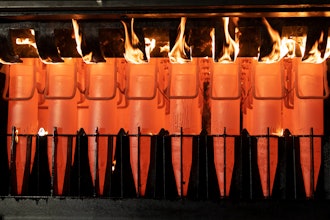PAJU, South Korea (AP) — North Korea on Thursday ordered a military takeover of a factory park that had been the last major symbol of cooperation with South Korea, calling Seoul's earlier suspension of operations at the jointly run facility as punishment for the North's recent rocket launch a "dangerous declaration of war."
North Korea said it was responding to Seoul's shutdown order by immediately deporting the hundreds of South Koreans who work at the complex just across the world's most heavily armed border in the city of Kaesong, pulling out the tens of thousands of North Korean employees and freezing all South Korean assets. The North also said it was shutting down two crucial cross-border communication hotlines.
Hours after a deadline set by North Korea passed, South Korea's government said all of the 280 South Korean workers who had been at the facility had finally returned to the South.
Their departure quashed concerns that some might be held hostage, and lowered the chances that the standoff might lead to violence or miscalculations.
Tensions have risen since North Korea's nuclear test last month, followed by its long-range rocket launch on Sunday that outsiders see as a banned test of ballistic missile technology. South Korea responded Thursday by beginning work to suspend operations at the factory park, one of its harshest possible punishment options.
South Korea said it would ban reporters from the border crossing on Friday.
"I was told not to bring anything but personal goods, so I've got nothing but my clothes to take back," a manager at a South Korean apparel company at the complex, who declined to give his name, told The Associated Press by phone before he crossed to the South.
Chang Beom Kang, who has been running an apparel company in Kaesong since 2009, said from South Korea that his company has about 920 North Korean workers — who didn't show up on Thursday — and seven South Korean managers at Kaesong.
He said one of his workers, who entered Kaesong earlier Thursday, was about to cross the border to return to South Korea with thousands of women's clothes produced at the factory. But at the last minute the employee had to drive back to the factory to unload the clothes because of North Korea's announcement that it would freeze all South Korean assets there.
"I'm devastated now," Kang said by phone, saying he's worried about losing credibility with clients because of the crisis.
Yonhap news agency, citing an unidentified military official, reported that South Korea bolstered its military readiness and strength along the western portion of the border in the event of a North Korean provocation. The report didn't elaborate on what that meant. Seoul's Defense Ministry would only say that its military has been on high alert since the North's nuclear test last month.
North Korea's Committee for the Peaceful Reunification of Korea said in a statement that the South's shutdown of Kaesong was a "dangerous declaration of war" and a "declaration of an end to the last lifeline of the North-South relations." Such over-the-top rhetoric is typical of the North's propaganda, but the country appeared to be backing up its language with its strong response.
The statement also issued crude insults against South Korean President Park Geun-hye, saying she masterminded the shutdown and calling her a "confrontational wicked woman" who lives upon "the groin of her American boss." Such sexist language is also typical of North Korean propaganda.
North Korea has previously cut off cross-border communication channels in times of tension with South Korea, but they were later restored after animosities eased.
Seoul said its decision on Kaesong was an effort to stop North Korea from using hard currency earned from the park to pay for its nuclear and missile programs.
North Korea, in a fit of anger over U.S.-South Korean military drills, pulled its workers from Kaesong for about five months in 2013. But, generally, the complex has long been seen as above the constant squabbling and occasional bloodshed between the rival Koreas, one of the last few bright spots in a relationship more often marked by threats of war.






















